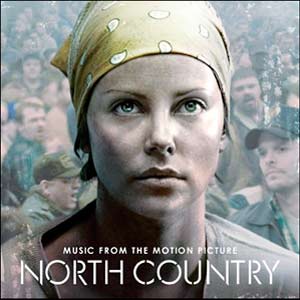North Country
Music composed and produced by Gustavo Santaolalla
Performed by Gustavo Santaolalla (ronroco, keyboards, percussion, pipes), Anibal Kerpel (keyboards), Michael Ward-Bergeman (Accordion), studio string section
Orchestrated/Conducted by David Richard Campbell
Available on Columbia / Sony Music Soundtrax (CK 97777)
Running Time: 46:07
Score Running Time: 8:38
Amazon UK Amazon US

In order to win an Oscar, Charlize Theron had to take the usual route for beautiful young actresses, by wearing dirty makeup and having messy hair and playing someone who was very much not a beautiful young woman, as murderer Aileen Wuornos in Monster. It doesn’t matter how good your performance, if you’re a beautiful young woman playing a beautiful young woman, you’re not going to win any awards. Lo and behold, just two years later, she again found herself nominated, this time for her performance as the victim of sexual harassment, miner Josey Aimes in North Country – again a role that demanded she be dressed down and look as downright ordinary as possible. In an industry where beautiful young women are celebrated in every other way possible, it’s plain strange that they have to make themselves appear anything but in order to receive the deserved critical reaction! The film itself, directed by Niki Caro, who made the excellent Whale Rider, was fairly well received, despite early reports mistakenly suggesting it was a poor relative of Erin Brockovitch.
Musically, Caro opted for a mostly song-based approach, with folk/country songs dominating. Most of these involve Bob Dylan – if not singing himself, then others covering his songs. In all, there are six Dylan tracks on the soundtrack album. Satisfyingly, they include a few of his lesser-known songs, including the unusually conventional, but quite gorgeous, ‘Sweetheart Like You’, Leo Kottke singing ‘Girl of the North Country’, alongside the old classic ‘Lay Lady Lay’. Here as well are the iconic ‘Werewolves of London’ by the ever-wonderful Warren Zevon, Kim Carnes’s classic ‘Bette Davis Eyes’ and – to complete a decidedly eclectic bunch – The Bellamy Brothers’ ‘If I Said You Had a Beautiful Body (Would You Hold It Against Me)’, whose title is remarkable in that somebody bothered to include a set of parentheses, but didn’t consider that an interrogative might need a question mark. Most notable is probably ‘Tell Ol’ Bill’, a brand new Dylan song – a pleasant country ballad, but not one likely to displace anything from his roster of classics.
Of more interest to film music fans may be the selections by recent Oscar-winner Gustavo Santaolalla. His celebrated BrokebackMountain music seems so simplistic and ordinary, it’s hard to believe that anyone would have paid it any attention if it hadn’t found itself in the year’s most talked-about “serious” film, and its place in the list of Oscar-winning film scores will surely dumfound people looking back in a few years’ time. His score for North Country (for what it is – there are only three tracks, running less than ten minutes in total) is along similar lines, though the pieces featured here are arguably a little more impressive than the considerably more detached music in Brokeback. There’s a very gentle feel, gently suggesting rolling meadows> and flowing breeze, which makes for very pleasant listening indeed. It’s inoffensively pleasant instrumental pop music, backed by a modest string section.
Santaolalla makes use of the ronroco, a small Brazilian guitar, with a distinctive sound. It’s an unusual device to use in a score for a film like this, though works well enough. Intriguingly, its use here (in what develops into essentially a courtroom drama) mirrors the placed usage of an instrumental piece by the composer, ‘Iguazu’, in Michael Mann’s The Insider when Russell Crowe’s character finally decides to testify at the deposition. The first two score pieces – ‘North Country’ and ‘A Saturday in my Classroom’ – are particularly slight, though the sweet, lovely ‘Standing Up’ is a miniature delight and quite affecting, sadly over almost before it’s begun. Santaolalla only burst onto the scene comparatively recently, and his rise has been swift indeed, but frankly I’m not convinced – it takes a very specific type of film where music like this (which seems to be virtually the only thing the composer does) will work well. I’m all for simplistic scores when the film demands it, but there is no more dramatic insight in music like this than there is in the film scores of people like Mark Knopfler – the composer’s at such an early stage in his career, it would be hugely unfair to jump to conclusions just yet, but it would be nice to hear something a little more ambitious from him.
As ever with these compilations, I am left wondering who exactly is going to buy this album. With such an eclectic mix of songs, and such a small quantity of score, it’s hard to imagine that many people are going to buy it for either one or the other, and just as hard to imagine that many people will be intrigued by both. If you like the sort of low-key country music that makes up the bulk of the album then you’re sure to enjoy it – but then, Dylan fans will already have all of his tracks anyway. It’s a well put-together disc, playing nicely from start to end, with the score selections sitting naturally alongside the songs, but frankly is so low-key and unremarkable that it’s likely to disappear from the memory almost as quickly as it arrives.
James Southall
Rating:
2.5
Return to Reviews Index